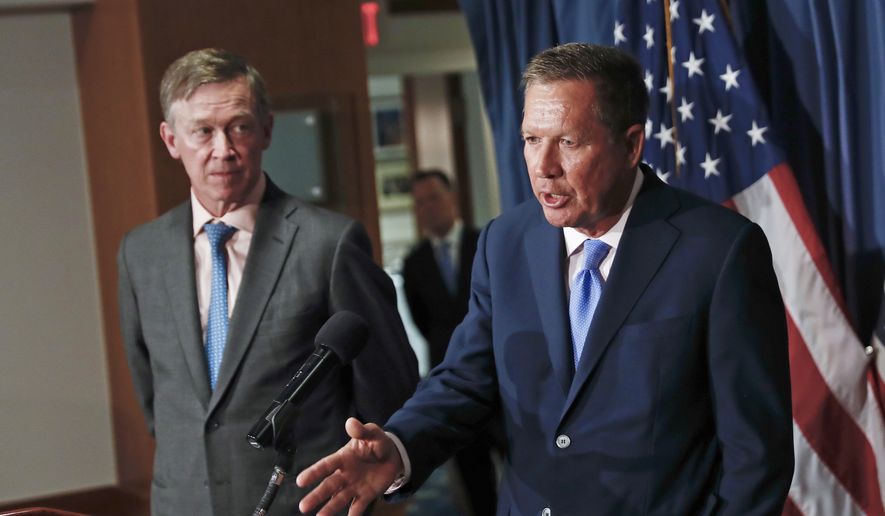Congress should restore contested Obamacare payments but let the states and private sector innovate to drive down costs, a trio of governors said Friday, stepping into the policy void left by a Congress deadlocked over fixing Obamacare.
Republican Gov. John Kasich of Ohio, Democratic Gov. John Hickenlooper of Colorado and Alaska Gov. Bill Walker, an independent, said the federal government should fund the “cost-sharing” payments that President Trump canceled last year, urge people to sign up for insurance instead of slashing outreach and help states set up “reinsurance” programs that subsidize extra-pricey consumers, so others don’t pay more.
It also says states should have a freer hand in seeing the “essential health benefits” that insurers must cover, as governors seek to provide cheaper options under the Obamacare framework.
The plan doesn’t endorse new taxpayer-funded insurance options or the type of European-style, single-payer system that Sen. Bernard Sanders and other liberals are championing.
Much of the conversation around health care reform has focused on measures that would increase or decrease the number of insured Americans, but the governors focused on affordability and the underlying costs of care.
Speaking at the National Press Club, they said Congress, the states and private sector must attack the underlying drivers of costs and price hikes in the health space by incentivizing doctors and hospitals to get people better, instead of billing for endless treatments.
“This is gonna save a ton of money,” said Mr. Kasich, who lost the Republican primary to Mr. Trump and is thought to be mulling a 2020 presidential bid.
Some states already do this through their Medicaid programs, and the federal government should tie payments to outcomes in each of its programs, the governors’ seven-page blueprint said.
CEOs should demand these reforms, too, the governors said, citing an effort by Amazon, Berkshire Hathaway and JPMorgan Chase to find a more efficient health system for their employees.
“It has to be the businesses in this country who say they’ve had enough,” Mr. Kasich said.
The state leaders spoke ahead of the National Governors Association’s weekend summit in Washington. They said Washington can’t afford to rest on its laurels after a messy 2017 over health care, since costs keep rising and Americans aren’t getting any healthier.
Mr. Hickenlooper said a bipartisan reform package “is the only real solution that will bear fruit,” after the Democrats pushed Obamacare across the finish line without Republicans in 2010, and GOP efforts to repeal it last year sputtered out of gas.
“There should not be party lines on this issue,” Mr. Walker added.
Mr. Trump wants to repeal and replace Obamacare entirely, preferably by block-granting health dollars to the states, yet Republican leaders aren’t eager to launch another thorny push for health care reform in a pivotal campaign year.
The administration has proposed workarounds to Obamacare, saying people should be able to hold short-term plans that don’t comply with President Obama’s coverage rules for a full year and that people in similar trades can band together in “association plans” that skirt the 2010 overhaul.
Democrats have blasted the moves as “sabotage” that will reverse hard-won reforms to shield the sick and usher in robust coverage. They’re pushing for additional taxpayer-funded options to plug holes in Obamacare.
Mr. Kasich said there should be a middle ground, in which governors use waiver authority to help people pick the type of coverage they want — rather than follow Obamacare’s prescriptive guardrails — and to tailor their Medicaid programs to their own populations, for instance tribal groups in Mr. Walker’s Alaska.
The federal government would still play a supporting role, he said, noting the benefits that Medicaid-expansion dollars have bestowed on his state.
Mr. Kasich also said he doesn’t understand why Congress is dithering over the cost-sharing payments, which reimburse insurer for picking up low-income customers’ costs and would reel in premiums.
Mr. Trump canceled the payments after he determined he couldn’t legally pay them on his own, yet some Republicans refuse to appropriate the money, saying it amounts to a “bailout” for insurers.
House conservatives balked at a bipartisan plan by Sen. Lamar Alexander, Tennessee Republican, and Sen. Patty Murray, Washington Democrat, that would restore the payments in exchange for letting states offer cheaper plan options to healthy consumers, leaving the effort in limbo.
“What happened to Alexander-Murray? It was here, it was gone,” Mr. Kasich said. “It’s like health care doesn’t matter any more.”
While Congress bickers, states are forging their own plans.
Idaho regulators is considering whether to let an insurer sell plans that may charge healthier people more than sick ones and cap annual claims at $1 million — two things barred by Obamacare. The proposal is angering Capitol Hill Democrats, who say it is a clear violation of federal law and that Mr. Trump should intervene.
The board that runs the D.C. insurance exchange, meanwhile, recommended changes on Friday to support the city’s Obamacare customers in the face of federal actions that “have jeopardized the stability of private health insurance.”
The exchange authority called for replacing the individual mandate to hold insurance or pay fine — Congress repealed it, effective in 2019 — with a local version of the prod.
Massachusetts has its own individual mandate, and other blue states are considering measures to ensure that healthy people stay in the markets.
It also called for a reinsurance program to keep premiums in check and a local supplement to federal subsidies that help qualified Obamacare consumers pay their monthly bills.
• Tom Howell Jr. can be reached at thowell@washingtontimes.com.




Please read our comment policy before commenting.